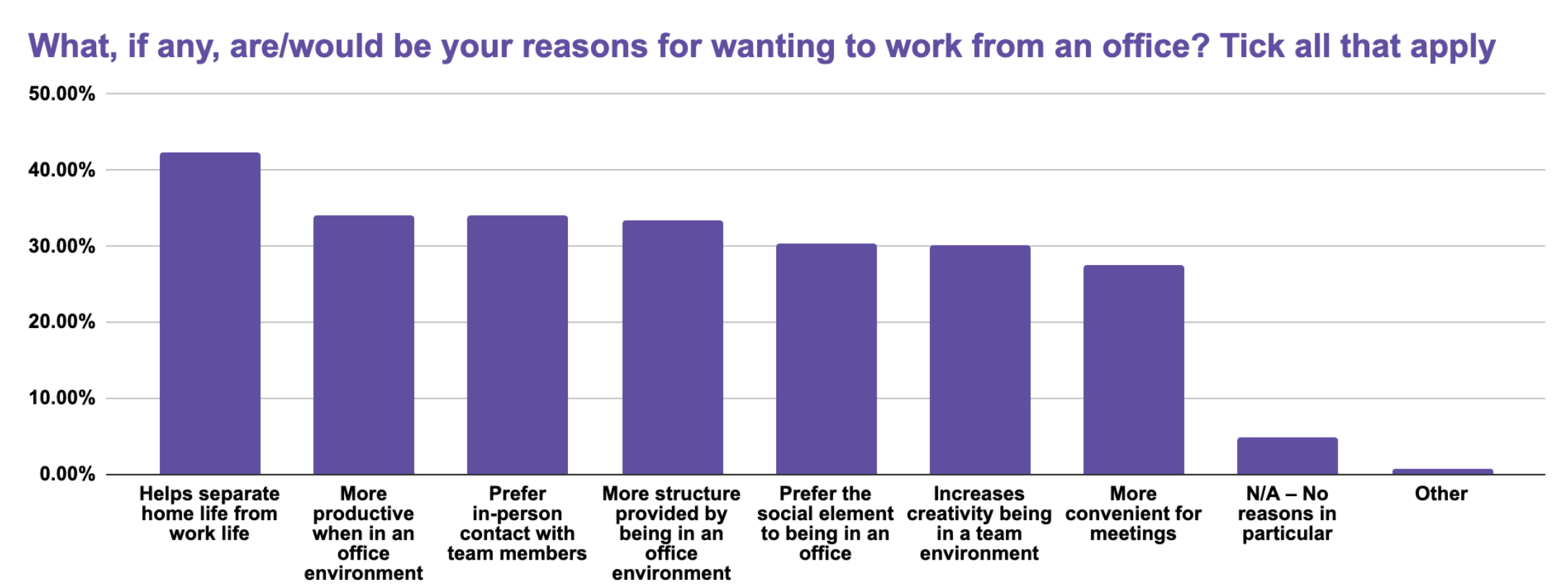- 2 Minute Read
- 23rd October 2024
Survey reveals 52.1%, favor working in the office rather than from home!
It’s 2024, and while hybrid work is here to stay, a recent survey we conducted on the preferences and attitudes of UK workers towards work environment shows that a majority still have a soft spot for the office. In fact, 52.1% of workers prefer working in the office over working from home. Surprising, right? But it’s not as simple as it seems. Let’s dive into what’s driving this preference and what businesses can learn from it.
Why Do People Still Prefer the Office?
The main reason: a better work-life balance. 42.3% of respondents said separating home and work life is easier when they head into the office. Here’s what else made the office appealing:
- More Productivity: 34% feel they get more done when in the office.
- Face-to-Face Collaboration: 34% also said in-person contact with their team is a major draw.
- Routine and Structure: 33.5% like the sense of structure that comes with a traditional office environment.

That said, working from home isn’t without its perks. A solid 42.1% of those who split their time between home and office say they’re more productive at home.

Top Cities Where Employees Prefer working from the office:
- Liverpool (65.9%)
- Southampton (61.9%)
- Newcastle (60.9%)
Meanwhile, cities like Nottingham (34.9%) and Brighton (40.1%) aren’t quite as enthusiastic about office life. It’s clear: location plays a big role in how workers feel about returning to the office.
Adapting to Employee Preferences: The New Playbook for Companies
As work models evolve, companies need to strike a balance between flexibility and maintaining the benefits of in-office work. Here are some key actions businesses should consider to keep their workforce engaged and happy:
1. Offer Hybrid Flexibility
While many employees appreciate the office, they still value the flexibility that hybrid work provides. Allowing workers to choose when and how often they come into the office helps meet their desire for balance.
2. Know Your Team's Preferences by Location
The survey shows that attitudes toward office work vary across cities. For example, employees in Liverpool and Southampton are more inclined to prefer the office, while those in Nottingham and Brighton lean towards remote work. Employers should tailor their strategies to regional preferences, recognizing that one-size-fits-all policies may not work.
3. Redefine Productivity Metrics
Given that many workers feel more productive at home, employers may need to reconsider how they measure productivity. Instead of focusing solely on in-office attendance, companies could emphasize output and results, no matter where the work is done.
Moving Forward: Offices Still Play a Key Role
The office remains a critical element of work culture, offering structure, collaboration, and a clear separation between work and personal life. However, flexibility is no longer a luxury—it’s a necessity. The businesses that succeed will be those that listen to their employees, adapt to changing preferences, and create an environment that combines the best of both worlds.
